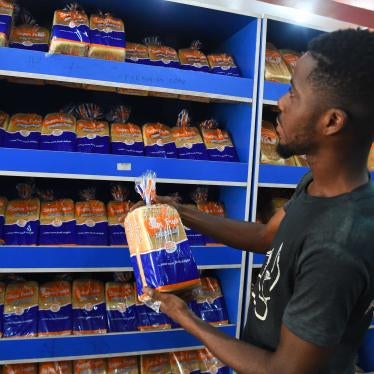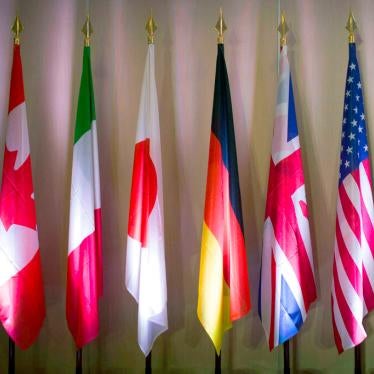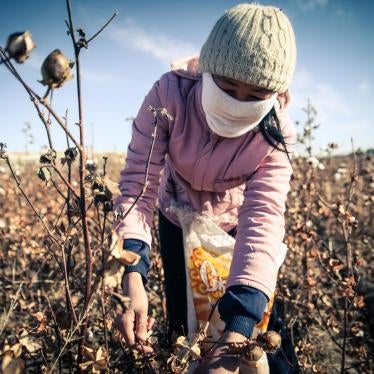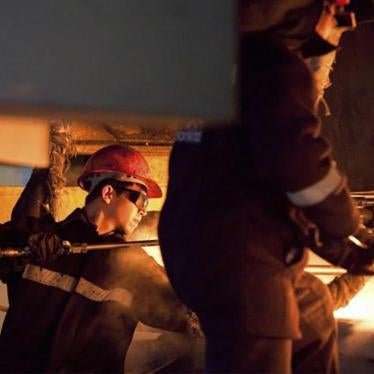This weekend, 2500 bankers, businesspeople, and bureaucrats convening in Romania for the annual meeting of the European Bank for Reconstruction and Development (EBRD) will neglect a significant aspect of the Bank's mission. The Bank was set up in 1991 to promote private sector development in Eastern European countries that are "committed to and applying the principles of multiparty democracy, pluralism and market economics." This reference to democratic principles, written into the agreement establishing the EBRD, was an important post-Cold War innovation. While politics are off limits for the World Bank, for example, the EBRD was expressly tasked with taking politics into consideration in its lending activities.
The Bank was set up in 1991 to promote private sector development in Eastern European countries that are "committed to and applying the principles of multiparty democracy, pluralism and market economics." This reference to democratic principles, written into the agreement establishing the EBRD, was an important post-Cold War innovation. While politics are off limits for the World Bank, for example, the EBRD was expressly tasked with taking politics into consideration in its lending activities.
Unfortunately, when it comes to the important symbolism of the Bank's annual meeting, there is scant evidence of the Bank's stated commitment to democracy. Where in the program of the annual meetings is a seminar on the development of independent media in the region, or its critical role in curbing corruption? Will anyone from the Organization for Security and Cooperation in Europe, which monitors elections throughout the region, participate in panel discussions? Will any finance minister touting the attractive investment climate in his country also feel compelled to report on his country's progress toward genuine multiparty democracy?
Even more telling than this year's agenda is the Bank's choice of Uzbekistan to host next year's annual meeting, a political and financial prize offering the host country an opportunity to showcase its economy to important international investors. Few countries in the region are less deserving than Uzbekistan.
In the decade since joining the EBRD, Uzbekistan's transition from communism has produced an authoritarian government profoundly hostile to democracy. The Bank's most recent country strategy for Uzbekistan, adopted in March 2001, reported that economic reforms are slow or stalled, "[t]he pace of democratic transition is also slow, and serious concerns remain regarding development of genuine multi-party democracy, pluralistic society and respect for human rights." The Bank deserves credit for appending this political assessment to its country strategy, but it renders the choice of Tashkent for the annual meeting all the more mystifying.
Uzbekistan is home to an estimated 7000 political and religious prisoners, widely tortured in custody and convicted in unfair trials. In the past year alone, seven people have died in custody allegedly due to torture. Uzbekistan has yet to hold an election considered free and fair by international observers. In January President Karimov rigged a referendum to extend his term in office to 2007. Free association and media are severely limited. There is no newspaper in Uzbekistan in which this article could be published.
This past week, more than forty fifty non-governmental organizations from twenty-four countries wrote to the Bank to express concern about Tashkent as the site for next year's meetings. These are not just groups concerned with human rights in Uzbekistan. They also include labor, environmental, and humanitarian groups from all corners of the region—members of European civil society who want to see the EBRD take seriously its commitment to open societies and the rule of law.
We are concerned that the EBRD has elected to convene in a country where some non-governmental organizations are refused registration, their members regularly harassed or jailed. The EBRD's annual meeting typically includes a program for non-governmental organizations, providing a valuable opportunity for meaningful dialogue with Bank officials on topics of mutual concern. But international non-governmental organizations have difficulty getting visas to visit Uzbekistan. Local Uzbek groups sometimes face harassment and temporary arrest as a consequence of their meeting international visitors. What will become of the civil society program at the Bank's annual meeting if it goes forward in such an environment? What is the message sent to governments intolerant of critical voices?
In the heady early days after the Cold War, the Bank's founders embraced the link between political and economic transition now vogue in development circles. The Bank should uphold its commitment to democracy and pluralism, not only because its shareholders promised to do so, but also because the elements of healthy democracy—respect for the rule of law, accountable government institutions, a vibrant civil society and media—are critical to the Bank's economic mission. As Bank President Jean Lemierre acknowledged at last year's annual meeting, transition and sustainable growth have "been most effective where democracy has taken root best."
In pursuit of that vision, the Bank should be working with the Uzbek government to achieve some pretty dramatic reform in the next twelve months, or start shopping for another venue for next year's meeting. Highlighting concern for democratic development at this year's meeting would be a good place to start.








